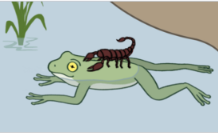The Frog and the Scorpion
This Blog presents my beliefs about why humans can’t choose or control their feelings and how trying to do so makes people miserable. Although I will focus on the negative side of human emotions and behaviour, I acknowledge that instinct generates many emotions that do not lead to bad behaviour.
This Blog aims to help people better understand, accept, and support each other. At this stage, I plan to post weekly. I would very much like your responses and contributions to my posts.
Understanding why people exhibit aggression and avoidance can help us deal with interpersonal conflict involving our children, partners, neighbours, bosses, colleagues, social groups, friends, community, or strangers. Such an understanding can help us accept the way things are and provide strategies and tactics to cope and, where possible, change.
Sharing this understanding with those we care about could improve your family, relationship, work, and community.
Sweetie, have you ever heard the Frog and Scorpion fable?
Daughter: No, Mom. What’s it about?
Mother: Well, it’s a story about trust and nature. A scorpion asks a frog to carry him across a river.
Daughter: That sounds dangerous. Why would the frog agree?

Mother: The scorpion promises not to sting the frog, saying they’d both drown if he did. The frog agrees, thinking it’s logical.
Daughter: Let me guess. Does the scorpion sting the frog anyway?
Mother: Exactly. Midway across the river, the scorpion stings the frog. As they both start to sink, the frog asks why. The scorpion replies, “I couldn’t help it. It’s in my nature.”
Daughter: Wow, that’s pretty dark. So what’s the point?
Mother: The moral is that some people can’t change their nature, even when it’s in their best interest to do so. It teaches us to be cautious about who we trust and to understand that actions often speak louder than words.
Daughter: I see. So it’s about being careful and understanding people’s true nature?
Mother: That’s right, honey. It’s a reminder to trust your instincts and be aware that not everyone has your best interests at heart.
Evolutionary Psychology would say that all people (not some) can’t change their nature, even when it’s in their best interest to do so.
The earliest known appearance of this fable is in the 1933 Russian novel The German Quarter by Lev Nitoburg.
Human Scorpion?
Destructive illogical behaviour and negative thinking are caused by an unconscious survival strategy aimed at keeping me safe. It uses comparisonitis and catastrophizing to make me feel bad initially and then uses my arousal to influence my actions.
All of this happens automatically and almost instantaneously. It’s only when my conscious mind catches up that I realize what has happened, and I’m left to rationalize my behaviour. I often do that by blaming someone or something else for my feelings and my behaviour.
“This causal chain is crucial for me to comprehend if I aim to develop effective strategies to achieve outcomes that I consciously choose rather than outcomes driven by my instincts.
Here are the steps and timing of this causal chain. Since the first four steps are unconscious, I cannot control them.
My instinct judges everything I experience without my awareness.
It employs comparison and catastrophic thinking to identify and eliminate threats to ensure species survival.
When a threat is identified, its tactics increase my arousal, leading to reflexive behaviour and negative emotions.
Only after I notice my arousal does my conscious mind step in to do something about it.

Not understanding instinct, I attempt to rationalize my feelings and behaviour with blame. I blame anyone and anything to avoid blaming myself. Sometimes, I will blame myself, but all too often, I blame others in an attempt to rationalize my negative feelings and behaviour.
Most people around me will judge and hold me accountable for my feelings and actions. Even if ulterior motives prevent them from telling this, they will still think it. Rarely will they blame my behaviour on others; it’s my fault.
However, since I have no control over my instincts, I am not the cause of my bad behaviour and feelings.
Regardless, I am responsible for my actions and emotions, and it is up to me to change if I want to.
The idea that I can change my feelings and actions by changing my attitude and thoughts is not helpful; it makes me feel worse. No matter how hard I try, I find it impossible to change unwanted feelings and reflexive behaviour because I have no control over my instincts. Instincts are unconscious, and I have no access to them.
Despite my impulsive behaviour and associated anxiety, anger, and depression, I need to accept the reality that I can learn to cope with my impulses and negative emotions. I can learn to be successful in spite of myself.
The purpose of this blog is to present understanding and coping strategies for dealing with unchangeable and changeable circumstances.
I will draw upon 40 years of clinical practice to illustrate the helpfulness of this model. If needed, I will use fictitious names to provide examples. The goal is to help people become more accepting of themselves and others, take more responsibility, place less blame and find success despite the negativity of my emotions in challenging situations.
Back to Read Our Posts